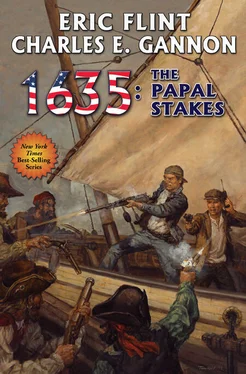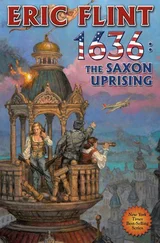Eric Flint - 1635 - The Papal Stakes
Здесь есть возможность читать онлайн «Eric Flint - 1635 - The Papal Stakes» весь текст электронной книги совершенно бесплатно (целиком полную версию без сокращений). В некоторых случаях можно слушать аудио, скачать через торрент в формате fb2 и присутствует краткое содержание. Жанр: Исторические приключения, на английском языке. Описание произведения, (предисловие) а так же отзывы посетителей доступны на портале библиотеки ЛибКат.
- Название:1635: The Papal Stakes
- Автор:
- Жанр:
- Год:неизвестен
- ISBN:нет данных
- Рейтинг книги:3 / 5. Голосов: 1
-
Избранное:Добавить в избранное
- Отзывы:
-
Ваша оценка:
- 60
- 1
- 2
- 3
- 4
- 5
1635: The Papal Stakes: краткое содержание, описание и аннотация
Предлагаем к чтению аннотацию, описание, краткое содержание или предисловие (зависит от того, что написал сам автор книги «1635: The Papal Stakes»). Если вы не нашли необходимую информацию о книге — напишите в комментариях, мы постараемся отыскать её.
1635: The Papal Stakes — читать онлайн бесплатно полную книгу (весь текст) целиком
Ниже представлен текст книги, разбитый по страницам. Система сохранения места последней прочитанной страницы, позволяет с удобством читать онлайн бесплатно книгу «1635: The Papal Stakes», без необходимости каждый раз заново искать на чём Вы остановились. Поставьте закладку, и сможете в любой момент перейти на страницу, на которой закончили чтение.
Интервал:
Закладка:
Miro continued his soothing explication. “Also, it would be precipitous to dismiss the religious toleration espoused in the USE as merely a facade. It is quite genuine. Yes, Gustav is a Lutheran, but he is also a wise ruler, wise enough to arrive at the same conclusion the peoples of the Graubunden did centuries ago: that a federated state, with religious toleration guaranteed by law, is the only way to end sectarian strife.”
Ziegler did not look fully convinced, but did look at least moderately comforted-enough to go ahead with business, at any rate.
Miro extended another tidbit of polite gratitude. “I would also like to express my thanks for gathering the supplies we requested earlier this month, in anticipation of our visit.”
“The lamp oil and pure spirits-you use these to power your ‘blimp?’”
“Yes, Colonel Jenatsch, that is correct. However, only a small part of the fuel goes to the actual propulsion. Most is used to generate the hot air that causes the vehicle to rise from the ground.”
“So without the fuel-?”
“The vehicle would be useless, immobile.” And Miro and Jenatsch exchanged another significant look, which amounted to Jenatsch indirectly signaling that he understood the vulnerabilities of the blimp and the need for Chur’s cooperation, and Miro affirming that he had no interest in being evasive or withholding information.
“The under-hanging part where you sit-the gondola? — seems to be rather small to make much difference to commerce. When you arrived today, I counted only ten persons, and it was crowded, at that.” Ziegler had removed his fists from the table in order to fold his arms.
Miro nodded. “It is small. And it is useless for cargos that are of great volume or mass. But Herr Ziegler, consider the small items that constitute much of today’s commerce: the ‘new’ commerce as it is being conducted in Amsterdam, and Venice-”
“-and Grantville.” Jenatsch’s smile was feral.
“-yes, and Grantville. It is a commerce in people, documents, bank notes, specie, books, plans, samples, chemicals, medicines, key ingredients. Imagine being able to issue timely market instructions to a factor in Venice in one or two days. Radio, if you have one, will become a possibility in the coming years-but even coded messages are no guarantee of confidentiality. On the other hand, the blimp is available right now and can transport high-value items a hundred miles in three hours, leaving a safe margin for operational error. I already have the first dozen flight manifests completely booked.”
“Will not weather prevent the flying of this blimp?”
“If it is severe enough, yes. Which is why we advertise two or three days per hundred mile journey: that represents a safe average.”
“That is also not much faster than a man on a horse.” Ziegler looked a bit smug.
“True enough, but that is a good day on a horse, and a very bad average for the blimp. But tell me this, Herr Ziegler: when was the last time a man on a horse made thirty-three miles a day over the Alps? And without the slightest vulnerability to bandits? That’s what the blimp assures: absolutely direct travel, completely free of banditry, from city to city-no costly adventures on the road. And it seems that travel through the passes south of here now frequently involves just such adventures.”
Ziegler frowned, but not out of anger. Miro had struck a responsive and very pertinent chord. Travel south from Graubunden was no longer a simple proposition. The once modestly populous valleys were now home to as many recent graves as people: accompanying the wars and purgings that had scourged Grisons in the past fifteen years, the Plague had swept through the region twice. Thriving towns were now shadows of themselves. Many smaller villages stood vacant, ruined by the harsh, battering winters. In this comparatively barren environment, bandits increased, but plied a sparse trade, made especially brutal and indiscriminate by the lack of prey.
But the source of this cycle of misery lay in the fact that all the major passes down to Italy funneled through Chiavenna, which was controlled by Graubunden’s arch-nemeses: Spain and Milan. Austria had also contributed to the Chur’s woes in the 1620s, but had become steadily less energetic in imposing its will upon Grisons. And, at the start of the decade, the inhabitants had been cheered by rumors of French aid.
But, in this world, Richelieu’s much-vaunted plan to send the duke of Rohan into the Valtelline-thereby seizing the only overland connection linking Spain to her forces in the Low Countries-failed to materialize. Jenatsch, an ardent supporter of Rohan’s campaign and presumed leader of France’s allies in Grisons, had watched these plans evaporate like morning mist once the arrival of the up-timers and their strange town from the future became widely known. The Spanish-French animosity diminished and ultimately transmogrified into the uneasy entente that allowed them to cooperate in the destruction of the Dutch fleet off Ostend in 1633. Like all contracts between thieves, their so-called League of Ostend was certain to unravel-sooner, rather than later. But in the meantime, Grisons continued to suffer under foreign interference or direct control.
So, naturally Georg Jenatsch was interested in any new stratagem for freeing his homeland. And for making himself a national hero in the process. Jenatsch’s monomania in pursuit of those objectives made him capable of changing his alliance, religion, and even his own traits-as the up-time histories attested. But Miro, meeting this man with whom he had cautiously corresponded for months, was satisfied that he had correctly identified the one character-trait of Jenatsch that was as steady as a lodestone and which made negotiations with him relatively predictable: he was far more famous for his decisiveness than for any deep wells of patience. Jenatsch was not mercurial, but he hadn’t the taste for long games or the temperament for waiting upon fickle fate to provide him with a tool to achieve his ends. An active and victorious new international force such as the USE was almost sure to catch and kindle his interest.
And, unsurprisingly, it obviously had. But he was too accomplished a statesman not to stringently critique the deal Miro was proposing. “So let us say that we become a part of your growing network of-do you call them ‘airing-domes’?”
“Aero-dromes,” supplied Miro mildly.
“Yes, ‘aerodromes.’ To have such a facility here is clearly advantageous for you: Chur is the most convenient way-point over the Alps. As I understand it, our location is valuable because it is less than one hundred miles from Biberach, on the north shore of the Bodensee, and also less than one hundred miles from Bergamo, in Venetian Lombardy. And so, perhaps more people of note will visit Chur, spend a bit more money. But how does this benefit us beyond that modest increase in trade?” Jenatsch smiled; he knew the answer, of course, but he wasn’t going to agree to the deal without suitable promises from Miro. And of course, Ziegler still had to have to have it spelled out for him.
Miro pointed to the opened letter before Jenatsch. “President Piazza’s letter outlines the general defense benefits rather comprehensively, I think.”
“I would have preferred a few more specifics, as well.”
“Please understand, Colonel Jenatsch, we must walk a thin line if we are to ensure that our relationship does not bring you more problems than it solves. Yes, Gustav Adolf has approved using Chur to facilitate our current operations into Italy. And yes, President Piazza has indicated that some of our proceeds from establishing your town as a transport hub would allow us to base a dedicated mercenary company-exclusively contracted to us-in Chur to secure it from foreign intrusions. But a more overt, national alliance would call attention to itself, and your most dangerous foes would not miss its significance.”
Читать дальшеИнтервал:
Закладка:
Похожие книги на «1635: The Papal Stakes»
Представляем Вашему вниманию похожие книги на «1635: The Papal Stakes» списком для выбора. Мы отобрали схожую по названию и смыслу литературу в надежде предоставить читателям больше вариантов отыскать новые, интересные, ещё непрочитанные произведения.
Обсуждение, отзывы о книге «1635: The Papal Stakes» и просто собственные мнения читателей. Оставьте ваши комментарии, напишите, что Вы думаете о произведении, его смысле или главных героях. Укажите что конкретно понравилось, а что нет, и почему Вы так считаете.











